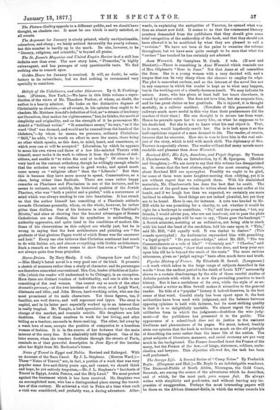Rowland Hill; His Life, Anecdotes, and Pulpit Sayings. By Vernon
J. Charlesworth. With an Introduction, by C. H. Spurgeon. (Hodder and Stoughton.)—We are sorry to say that this volume has disappointed us. It seems that the best stories, anyhow the most amusing stories, about Rowland Hill are apocryphal. Possibly we ought to be glad, for some of them were more laughter-moving than edifying, yet it is not without regret that we relinquish them. With his diminished materials, Mr. Charlesworth has done the beat that he could. The character of the good man whom he writes about does not suffer at his hands, and if we laugh less than we expected, we certainly are more inclined to admire. Good things are not indeed plentiful, but yet they are to be found. Here is one, for instance. A note was handed to Mr. Hill while he was preaching for a charity, to ask whether it would be right for a bankrupt to contribute. "No," said the preacher, "but, my friends, I would advise you, who are not insolvent, not to pass the plate this evening, as people will be sure to say, There goes the bankrupt.'" A Scotch minister, assisting at an ordination, not being able to reach with his hand the head of the candidate, laid his cane upon it. " This,': said Mr. Hill, "did equally well. It was timber to timber." (This sounds apocryphal.) An Antinomian reproached him with preaching "a legal gospeL" "Do you acknowledge," asked Mr. Hill, "The ten Commandments as a rule of life ?" "Certainly not." "Charles," said Mr. Hill to the servant, " show that man to the door, and keep your eye upon him till he is beyond the reach of the coats." The more serious utterances, given as pulpit sayings " have often much force and truth.






































 Previous page
Previous page